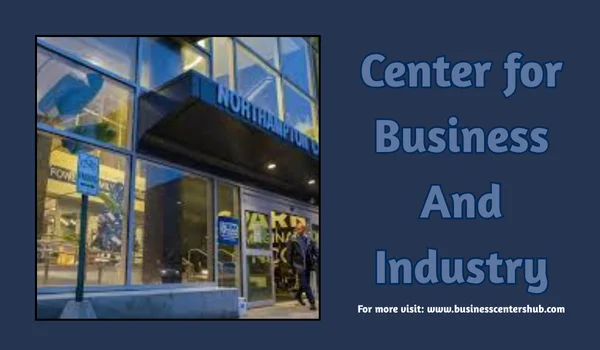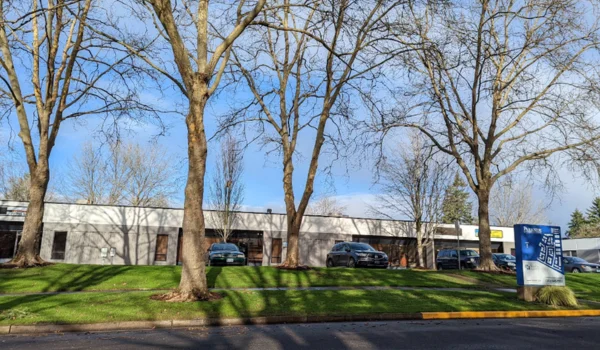“Center for Business And Industry” (often abbreviated CBI) is a name used by several institutions in the U.S., but in many cases refers to facilities tied to community colleges or workforce development, rather than pure commercial coworking business centers. These centers are typically designed to offer training, professional development, small business support, and sometimes facilities for business events. The objective is to bridge the gap between education, industry, and economic growth. Two good examples are:
- The Chemeketa Center for Business & Industry (Salem, Oregon) which provides training, customized workforce development, and small business advising.
- The Community College of Philadelphia’s Center for Business and Industry, which has classrooms, conference rooms, computer labs, and programs oriented toward workforce enhancement.
This article treats “CBI” as a hybrid center that may combine both educational / vocational training functions and business center-type facilities.
Facilities & Services

Depending on the specific CBI location, the facilities & services usually include:
- Training Classrooms & Computer Labs: For workforce training, continuing education, tech upskilling, software training, and sometimes certification courses. Example: Chemeketa CBI offers customizable training classes.
- Conference / Meeting Rooms: Spaces for seminars, meetings, workshops, community sessions. E.g. Philadelphia’s CBI has conference/meeting rooms.
- Office / Administrative & Support Facilities: For staff, sometimes for small business counseling, resource libraries. Some CBIs have office space and administrative support for their programs.
- Business Advising & Small Business Development: Counseling, mentoring, customized training programs designed to help existing businesses or startups. Example: Chemeketa offers small business advising and resource library.
- Event Rental / Venue Services: Some CBIs offer their rooms for rent for events, workshops, or hosting corporate / community events. Community College of Philadelphia’s CBI is in a building with “conference rooms, classroom, smart podiums, etc.”
- Facilities like Lounge / Study / Waiting Areas: Common in college-based CBIs. Philadelphia’s CBI includes student lounge areas.
What they typically do not offer (or offer less commonly) compared to commercial coworking hubs:
- Dedicated coworking desks / hot-desk memberships
- Fully private offices for rent in a commercial sense
- 24/7 access, or extensive after-hours amenities, coffee shops, etc.
Google Maps Location
Timings & Working Hours
For CBIs associated with colleges or public institutions, the hours are usually tied to academic schedules, staff availability, and course timetables. Based on examples:
- The Community College of Philadelphia’s CBI is open 7:00 AM to 10:00 PM Monday–Thursday during class sessions, and shorter hours on Fridays and Saturdays.
- The Chemeketa Center for Business & Industry has regular administrative hours (during business days), though some training programs or workshops may happen evenings. Exact hours vary by campus.
Because CBIs are not purely business centers, hours for services (e.g. meeting room rental or business advising) may require appointment or prior booking, and some services may only be available during “business hours” (roughly ~8-9 AM to 4-5 PM).
Accessibility
Typical accessibility features for CBIs:
- Public Transit / Bus: Many urban CBIs are located on or near college campuses with good city transit access. E.g. Philadelphia’s CBI is on Main Campus, well served by SEPTA lines.
- Parking: Usually there is campus parking, sometimes paid, sometimes free for students or public visitors, depending on the institution. Philadelphia’s example mentions a large parking garage.
- Proximity to Airports / Major Roads: Varies widely. Many CBIs are within regions reachable via highways, sometimes near smaller regional airports; but not typically geared to frequent traveler convenience.
- Other Amenities: Because of their educational / public nature, CBIs often have shared amenities like cafeterias, restrooms, study areas, etc., within the larger campus infrastructure.
Key Details Table
Here are typical details drawn from known data for two representative CBIs:
| Category | Details (Philadelphia CBI / Chemeketa CBI) |
| Address | Philadelphia: 1751 Callowhill Street, Philadelphia, PA 19130 Chemeketa: 626 High St NE, Salem, OR 97301 |
| Contact Number | Philadelphia: +1 (215) 496-6170 Chemeketa: 503-399-5181 |
| Email ID | Not always clearly listed publicly; many use institutional or college-based email/contact forms (e.g., at Chemeketa or CCP) |
| Timings / Working Hours | Philadelphia CBI: during semesters, ~7:00 AM-10:00 PM Monday-Thursday; shorter hours Fridays, Saturdays. Chemeketa CBI: regular weekday business hours; some evening/special session hours. |
| Facilities / Services | Classrooms, computer labs, conference / meeting rooms, business training/advising, resource library, student lounge areas, smart classrooms / videoconferencing. |
| Official Website | Philadelphia CCP site (Community College of Philadelphia) center pages. Chemeketa CBI site. |
| Target Audience | Workforce learners, small businesses / entrepreneurs, students seeking career-training, local businesses wanting customized employee training, public sector needing space for seminars or workshops. |
Pros & Cons
Pros:
- Strong Educational / Training Infrastructure – CBIs often have high-quality classrooms, computer labs, and technology (smart podiums, etc.), which is excellent for training and seminars.
- Cost-Effective / Publicly Funded – Because many are part of colleges, fees tend to be lower than purely commercial business centers; many resources (labs, meetings rooms) available to public or small business at subsidized or lower cost.
- Meaningful Business Support Services – Advising, customized training, networking, and resource libraries are key strengths. For small business owners, especially, these are valuable.
- Convenient Access & Campus Amenities – Access to parking, cafes, restrooms, student services; plus transit access in urban CBIs (Philadelphia example) make them reasonably accessible.
- Flexibility for Programs / Workshops – Many CBIs allow renting space for workshops, community events, and may have evening / special session hours.
Cons:
- Limited Co-Working / Private Office Space – For someone looking for a dedicated private office or hot-desk coworking model, CBIs generally don’t offer those in the way commercial business centers do.
- Restricted Hours for Certain Services – Some services (meeting room bookings, business advising) may only operate during staffed hours; evenings or weekends may be limited or require special arrangement.
- Booking & Resource Constraints – High demand can mean conference rooms or labs must be booked well in advance; during peak times / semesters space might be tight.
- Mixed Public Access – Because of being part of educational institutions, access (parking, entrance) might require navigating campus rules; visitor parking may be limited or paid.
- Not Built for 24/7 Business Use – For businesses needing round-the-clock access, flexible hours, or amenities like 24/7 coworking, CBIs are less suited.


